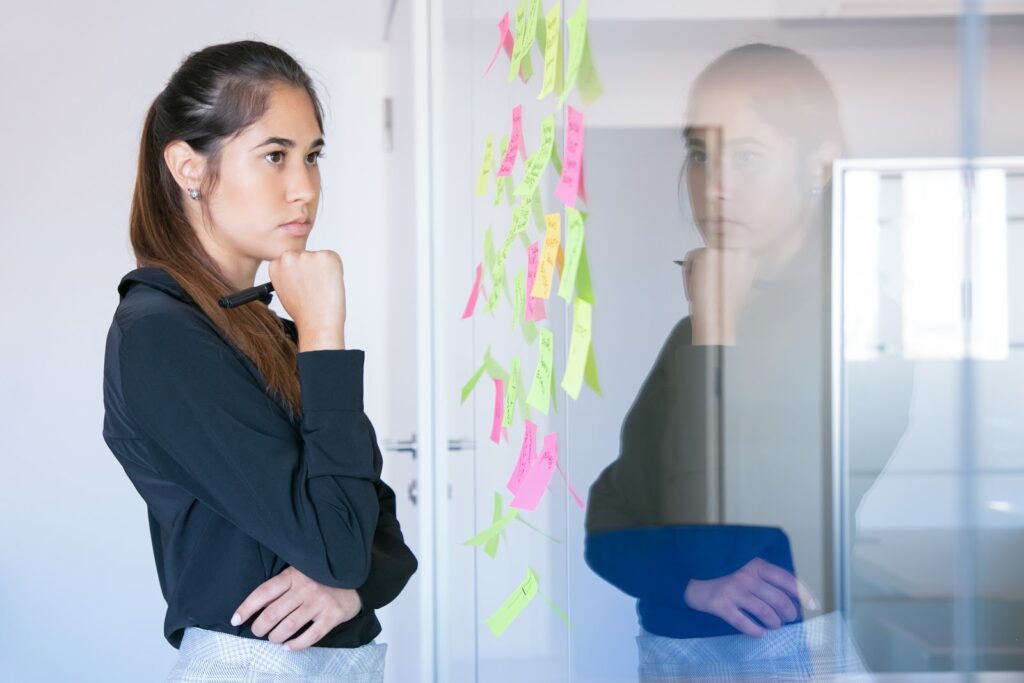Self-reflection is a key tool for personal development. It helps us to stay on track with our values and goals in life, to better deal with the challenges we face and to understand our true motivations. But what exactly is self-reflection and how do we practice it?
What is self-reflection?
Self-reflection is the observation and understanding of ourselves, our own thoughts, behaviour, motivations and attitudes. Its most important elements are:
- Conscious observation of ourselves
- Clarifying our self-image (what we think of ourselves)
- Comparing the results of the observation with our self-image to gain a better understanding of ourselves and identify areas for improvement
Self-reflection allows us to analyse our lives at both micro and macro levels. On a macro level, we can assess the general direction of our life, i.e. where we are going, whether this direction makes us happy. It is important to be aware of this because it is the only way to be able to make changes if necessary.
At a micro level, we can assess our responses to our circumstances and events in our environment, both at a personal and professional level. This gives us the opportunity to identify our strengths and weaknesses, to see more clearly and to find out what is really important to us.

Why is self-reflection important?
The regular (but not excessive) practice of self-reflection requires energy and discipline, but it is also an extremely valuable exercise. What are the benefits of regular self-reflection?
- Helps us develop ourselves effectively in the long term, tailored to our needs
- Develops emotional intelligence
- It helps us to understand our habitual reactions and to replace them with more effective, thoughtful patterns of behaviour
- We become able to rise above intense emotional states and see events from a broader perspective, which enables us to make better decisions
- By understanding our own drivers and needs, we can play a big role in preventing burnout
- Helps you stay on the right track
- Facilitates trusting relationships with others by being able to clearly explain why we did what we did, how we arrived at our decisions, how we felt
Why do we avoid self-reflection?
It is a common phenomenon to avoid self-reflection despite the benefits listed above. The reason is that we involuntarily try to maintain our self-image and therefore ignore feedback and events that suggest we should change. In a way, this is understandable, as admitting our mistakes compromises our sense of self, which is not a very pleasant feeling.
What are the characteristics of people who persistently avoid self-reflection?
- They do not take responsibility for negative events in their lives, blaming their environment and circumstances
- In stressful situations, they hurt those closest to them, such as family and friends
- They get "stuck" in a situation that is not to their advantage and are unable to move on
Self-reflection is a very valuable and easily developed skill, which is worth practising consciously and regularly.
Excessive exercise is not good either!
However, it also happens that someone can "fall over the edge" and devote so much energy to observing themselves that it becomes a hindrance to their daily life. Think about what would happen if, for example, at work, in the course of our normal daily activities, we analysed and observed our every move? Constant observation can have a negative impact on the pace of our work and the quality of our relationships and interactions.
The following tips will help you maintain the necessary balance and practice self-reflection effectively:
- Set aside a dedicated time or time frame (e.g. 20-60 minutes) during the day when you can reflect on yourself, your behaviour that day, your encounters with others, your reactions. If possible, try to seek feedback in a protected environment (e.g. group therapy, coaching, or from a very close friend). Learn to accept constructive (and respectful) criticism!
- It is also worthwhile to formulate focus, goals and priorities in your own work, and to deal with one urgent or important area of development at a time.
- It is not self-reflection if we are constantly negative and critical of ourselves. Rather, try to just observe our behaviour without judgement and look for opportunities for improvement and possible first small steps!
- Let's accept that there will be times when we are unable to self-reflect: such as heightened emotional states or a very stressful period. That's OK, we'll have time to evaluate the events afterwards!

Steps to self-reflection
Although it may seem simple at first, many people find that they don't know how to engage in conscious self-reflection.
Identify the most important questions!
At the start of the process, it is worth defining exactly what areas and questions you want to ask yourself on a daily/weekly/monthly and even yearly basis.
It is worth thinking about the issues from a mental, physical, spiritual, workplace and relationship perspective.
We've also brought a little help:
- Strengths - What are my strengths? For example, can I think clearly? Am I empathetic? Am I organised? Do I eat healthily? Stb
- Weaknesses - What are my weaknesses? Am I easily distracted? Do I move little? Do I get easily annoyed?
- Capabilities - What skills do I have, what am I good at? Do I communicate well? Do I work effectively?
- Problems - What are the problems at home/at work that bother you? Why do they bother you? What specifically bothers you? What thought patterns make the experience unpleasant?
- Results - What have I achieved so far? What has given me pleasure, what has been memorable? What else would I like to achieve. What I want to achieve is why/is it really important to me?
- Solutions - If I have already solved a problem, how exactly did that happen? Is it possible to transfer any of it to the current situation? How can I use my strengths to make the current situation better? How can I improve my skills?
- Progress - What is the smallest first step I can take (even today) to progress? How can I remind myself in the coming weeks of the goal I want to achieve?
Let's keep a diary!
Keeping a diary is a great way to see your progress. Writing helps us organise our thoughts, and by writing down our problems and possible solutions, we can prevent ourselves from constantly thinking about the same thing. The diary can also give us an insight into our own language towards ourselves, and we can evaluate what we write as an "outside observer", which helps us to develop a more objective, broader perspective. A Google or word document, which can be easily opened at work or during a lunch break, can be a perfect tool for this.
Carrying out activities to promote self-reflection
The following activities can help you in the process of getting to know yourself:
- Regular meditation - you don't have to be perfect at it. Sit quietly, listen to your breathing and notice where your mind wanders.
- Let's go out into nature! The fresh air and the closeness of nature help us clear our minds, and sitting on a bench or a rock is the perfect place to find a place to be introspective.
- Let's say our thoughts out loud! Often, by hearing what we think out loud, we can wake up to important things. We can also engage in dialogue with ourselves, as a two-perspective approach promotes self-reflection
Get outside help!
Group counselling or coaching allows you to get feedback in a protected environment, helps you to develop a new, more useful way of seeing things and thus to formulate creative and effective solutions. They can help us to significantly accelerate our self-awareness, to define or redefine our goals and to evaluate progress, thus significantly speeding up the process of development.

 Designabc
Designabc